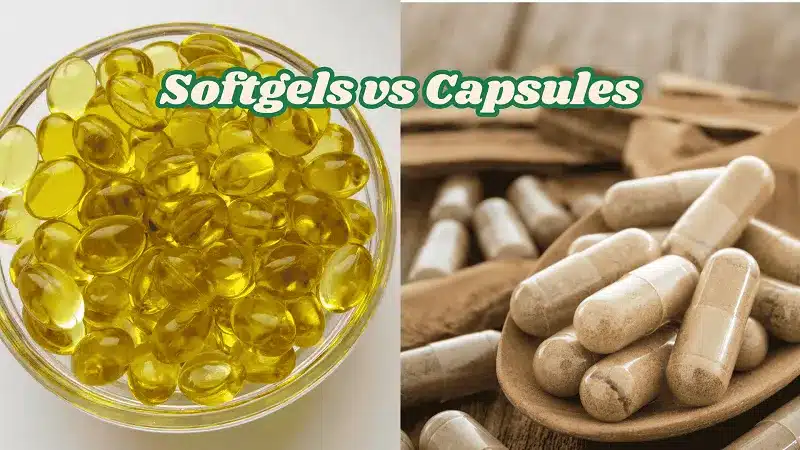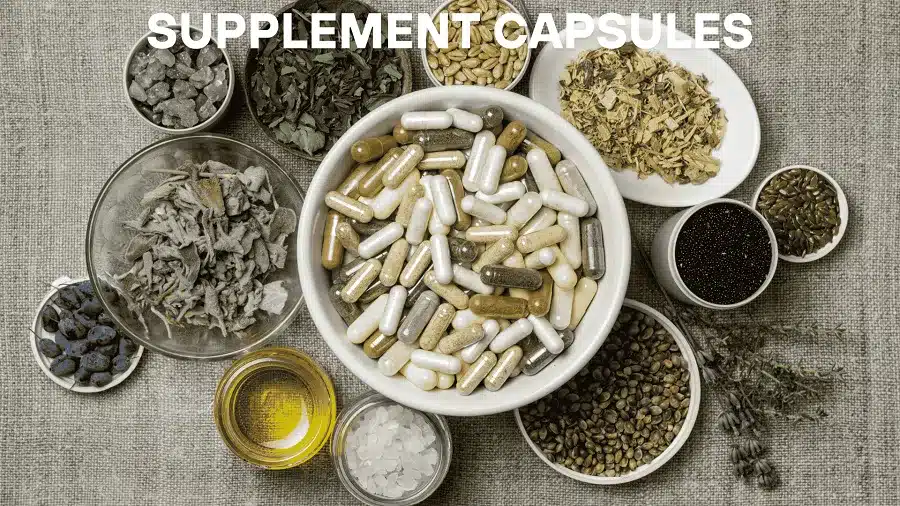식이 보조제의 세계에서, 소프트젤 대 캡슐 is a common comparison for consumers choosing the best delivery method for nutrients like vitamins, omega-3s, or herbal extracts. As non-pharmaceutical supplement forms, softgels and capsules differ significantly in composition, absorption efficiency, and user experience. This article provides a scientific comparison of softgels and 캡슐, addressing key aspects: absorption, benefits, how to take softgel capsules, how long capsule pills take to kick in, disadvantages of softgels, whether softgels work faster than capsules, if softgels are considered capsules, and if soft gels are healthy. This guide will help you select the right supplement form for your needs.
I. Definitions and Clarifications
Are Softgels Considered Capsules?
Softgels, also known as soft gelatin capsules, are single-piece, flexible shells made of gelatin (or vegetarian alternatives like starch) filled with liquid or semi-liquid ingredients, such as oils or suspensions. They are typically oval and smooth, designed for easy swallowing. Capsules, in contrast, refer to hard-shell, two-piece capsules, usually gelatin-based, filled with powders, granules, or pellets.
To clarify a common question: Are softgels considered capsules? Yes, softgels are a subtype of capsules. However, their soft shell and liquid contents distinguish them from traditional hard capsules, impacting nutrient delivery and absorption.

II. Softgels vs Capsules: Absorption
Absorption is a critical factor in determining a supplement’s effectiveness. Softgels excel due to their liquid or semi-solid contents, which dissolve quickly in the stomach’s acidic environment, leading to higher bioavailability—particularly for fat-soluble nutrients like fish oil or vitamin D. Studies show softgels can enhance the absorption rate of active ingredients, allowing nutrients to enter the bloodstream faster.
Hard capsules, with their powdered contents, dissolve more slowly, potentially reducing absorption efficiency for certain nutrients. While still effective, they may not match softgels’ speed for oil-based supplements. For example, in omega-3 supplements, softgels offer superior fatty acid utilization. Absorption differences directly influence a supplement’s overall efficacy.
III. Softgel vs Capsules: Benefits
Benefits of Softgels:
- Ease of Swallowing: Their smooth, flexible texture makes them ideal for those who struggle with larger pills.
- Faster Activation: Liquid contents lead to quicker nutrient release, ideal for supplements like caffeine or essential oils.
- Hermetic Seal: Protects sensitive ingredients from oxygen and light, preserving potency (e.g., vitamin E or probiotics).
- Taste and Odor Masking: The sealed design minimizes unpleasant flavors, such as in fish oil supplements.
Benefits of Capsules:
- 다용도성: Suitable for a wide range of dry ingredients, including powders and blends, making them ideal for multi-ingredient supplements.
- Cost-Effective: Cheaper to produce and purchase than softgels.
- Tasteless and Odorless: Effective for dry herbs or minerals, with minimal taste issues.
- Customizable Dosing: Can sometimes be opened to adjust doses (if permitted by the supplement).
요약하자면 소프트젤 are ideal for oil-based or fast-absorbing supplements, while capsules are better for budget-friendly, dry-powder formulations.
IV. Softgel Capsules: How to Take
Taking softgel capsules is straightforward: Swallow them whole with a full glass of water, preferably during or after a meal to enhance absorption and minimize stomach discomfort, especially for fat-soluble nutrients. Avoid chewing or crushing softgels, as this can release the liquid contents prematurely, causing a bitter taste or reduced effectiveness. For those with swallowing difficulties, techniques like tilting the chin slightly toward the chest while swallowing can help.
Capsules follow similar guidelines but may offer flexibility, as their contents can sometimes be mixed with food if permitted. Always follow the label’s dosage instructions and consult a healthcare professional for personalized advice.
V. How Long Do Capsule Pills Take to Kick In?
The time it takes for capsule pills to kick in depends on the supplement, individual metabolism, and whether taken with food. Hard capsules typically take 20-60 minutes to dissolve in the stomach, with effects noticeable within 30-60 minutes for most supplements. For example, a caffeine capsule may produce effects in about 30-45 minutes, though long-term benefits (e.g., correcting vitamin deficiencies) may take weeks to months.
Do Softgels Work Faster Than Capsules?
Yes, softgels generally work faster due to their liquid contents and softer shell, dissolving in 10-20 minutes. This makes them ideal for supplements requiring rapid effects, such as energy boosters.
VI. What Are the Disadvantages of Softgels?
Despite their advantages, softgels have notable drawbacks:
- Higher Cost: Complex production processes make them pricier.
- Shorter Shelf Life: Higher water content can lead to degradation if not stored properly.
- Limited Ingredient Compatibility: Unsuitable for moisture-sensitive powders; plasticizers in the shell (e.g., phthalates) may raise concerns.
- Potential Leakage: Damaged softgels may leak, though rare in high-quality products.
- Larger Size: May be challenging for some to swallow.
In contrast, capsules are more stable and affordable but may offer slower absorption and less protection for oils.
VII. Are Soft Gels Healthy?
Are soft gels healthy? Yes, when sourced from reputable manufacturers, softgels are safe, using natural or plant-based shells that enhance nutrient bioavailability without excess fillers. Their healthiness depends on the active ingredients—for example, high-quality fish oil softgels support heart and skin health. However, some studies note potential risks from trace plasticizers like phthalates, which may contribute to inflammation with long-term exposure. Choose third-party tested products and check for allergens (e.g., gelatin) to ensure safety.
VIII. Direct Comparison: Pros and Cons Table
The following table summarizes the comparison:
| 측면 | Softgels Pros | Softgels Cons | Capsules Pros | Capsules Cons |
|---|---|---|---|---|
| 흡수 | Faster, higher bioavailability | 더 높은 비용 | Versatile for dry ingredients | Slower dissolution |
| 혜택 | Easy to swallow, sealed, masks taste | Shorter shelf life | Cost-effective, flexible | Weaker protection for oils |
| How to Take | Swallow whole with water | Cannot crush | Can mix with food (if permitted) | Similar, but harder shell |
| Time to Kick In | 10-20 minutes, faster | N/A | 20-60 minutes | Slower onset |
| 단점 | See above | Leakage risk, plasticizers | N/A | Slower absorption |
| Healthiness | Enhances bioavailability | Depends on contents | Safe for most | Similar, but potentially lower absorption |
IX. Conclusion
The key differences between softgels and capsules lie in their suitability: softgels excel for rapid absorption and oil-based supplements, while capsules are more economical and versatile for dry ingredients. For instance, fish oil is best in softgels for optimal absorption. Choose based on your supplement type and personal needs, and consult a healthcare professional for tailored advice to ensure safety and efficacy.
참조
- 출처: Absorption of folic acid from a softgel capsule compared to a standard tablet – PubMed Link: https://pubmed.ncbi.nlm.nih.gov/22814927/
- 출처: SoftGels vs. Tablets | Soft Gel Technologies Link: https://www.soft-gel.com/blog/softgels-vs-tablets


